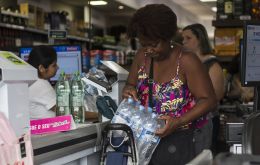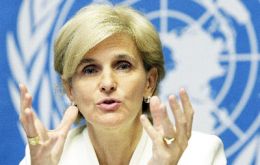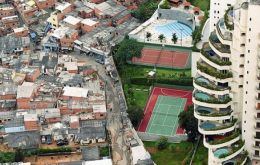MercoPress. South Atlantic News Agency
Tag: drinking water
-
Thursday, January 16th 2020 - 08:28 UTC
“Contaminated drinking water” in Rio: run on bottled-water in supermarkets

Widespread complaints over foul-smelling drinking water in Rio de Janeiro have triggered a run on supermarket bottled water, though the public utility denied any health risk on Wednesday.
-
Thursday, August 22nd 2019 - 15:51 UTC
Microplastics in drinking water, “low risk” for human health, says WHO

Microplastics contained in drinking water pose a “low” risk to human health at current levels, but more research is needed to reassure consumers, the World Health Organization (WHO) said on Thursday.
-
Tuesday, June 18th 2019 - 08:45 UTC
Billions suffer from poor access to water, sanitation and hygiene, says Unicef and WHO report

Billions of people around the world are continuing to suffer from poor access to water, sanitation and hygiene, according to a new report by UNICEF and the World Health Organization. Some 2.2 billion people around the world do not have safely managed* drinking water services, 4.2 billion people do not have safely managed sanitation services, and 3 billion lack basic** hand-washing facilities.
-
Thursday, April 13th 2017 - 07:17 UTC
Radical increase in water and sanitation investment required to meet development targets

Countries are not increasing spending fast enough to meet the water and sanitation targets under the Sustainable Development Goals (SDGs), says a new report published by the World Health Organization (WHO) on behalf of UN-Water – the United Nations inter-agency coordination mechanism for all freshwater-related issues, including sanitation.
-
Wednesday, July 1st 2015 - 20:27 UTC
Lack of sanitation for 2.4 billion people undermining health improvements

Lack of progress on sanitation threatens to undermine the child survival and health benefits from gains in access to safe drinking water, warn WHO and UNICEF in a report tracking access to drinking water and sanitation against the Millennium Development Goals.
-
Friday, May 25th 2012 - 21:40 UTC
Almost 19 million urban Brazilians live with no access to drinking water of sewage

Almost 19 million Brazilians live in precarious housing with no running water, sewage or any basic public services, according to a report on urban infrastructure by the Brazilian Geography and Statistics Institute, IBGE.
